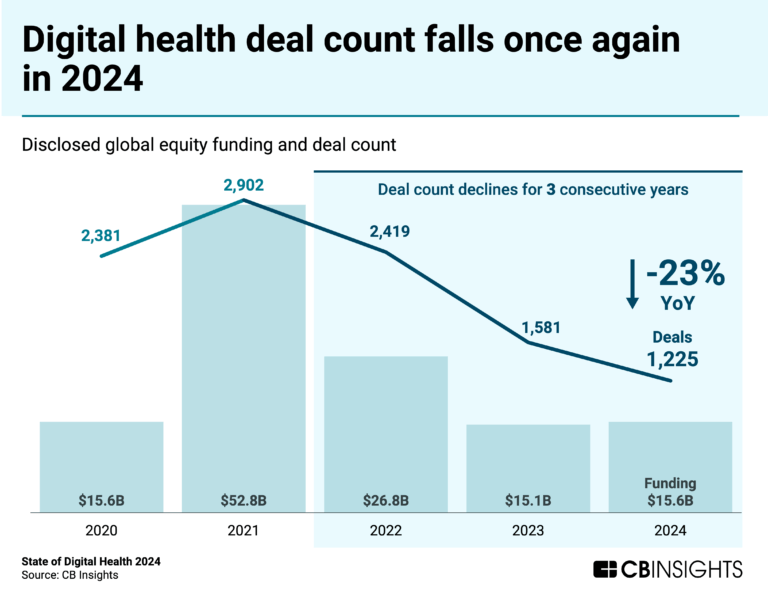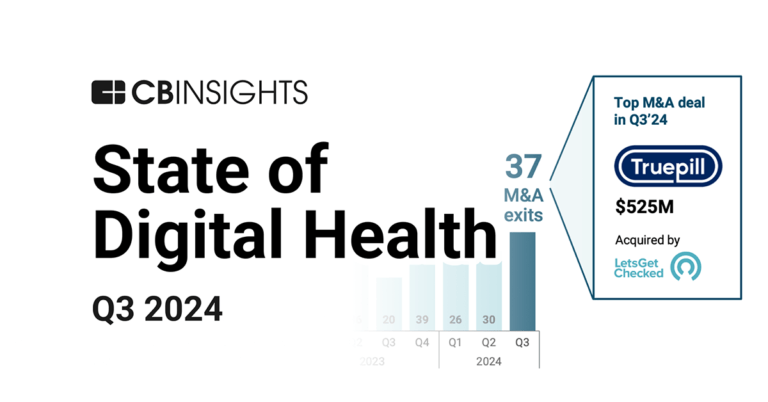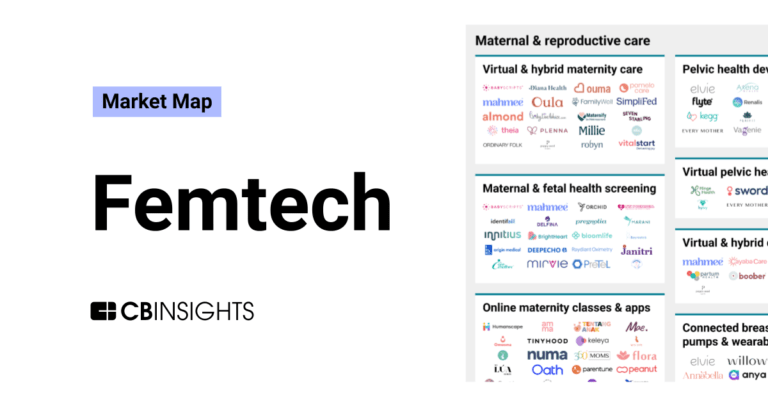
Flo Health
Founded Year
2016Stage
Series C | AliveTotal Raised
$270.5MValuation
$0000Last Raised
$200M | 1 yr agoRevenue
$0000Mosaic Score The Mosaic Score is an algorithm that measures the overall financial health and market potential of private companies.
-52 points in the past 30 days
About Flo Health
Flo Health focuses on female reproductive health. It offers a suite of products and services designed to support women throughout their reproductive lives. The company provides a period and ovulation tracking app, fertility calendar, and pregnancy assistant, which are complemented by personalized health insights and educational content. Flo Health primarily serves individuals seeking reproductive health support and education. It was founded in 2016 and is based in London, United Kingdom.
Loading...
Flo Health's Product Videos


ESPs containing Flo Health
The ESP matrix leverages data and analyst insight to identify and rank leading companies in a given technology landscape.
The menstrual cycle tracking apps market provides digital solutions for tracking menstrual cycles, fertility windows, and reproductive health indicators. These platforms range from dedicated mobile applications to wearable devices and hardware with integrated tracking capabilities. Key features include period prediction, ovulation tracking, symptom monitoring, hormone analysis, and fertility plann…
Flo Health named as Leader among 11 other companies, including Oura, Glow, and Clue.
Flo Health's Products & Differentiators
Flo Health App
Flo is a leading global women’s health app with over 350 million downloads, and 63 million monthly users. Flo supports women and people who menstruate during their entire reproductive lives by providing curated and predictive insights about their cycle and ovulation tracking, personalized health insights, expert tips from over 120+ medical experts, and a fully closed community for people to share their questions and concerns.
Loading...
Research containing Flo Health
Get data-driven expert analysis from the CB Insights Intelligence Unit.
CB Insights Intelligence Analysts have mentioned Flo Health in 3 CB Insights research briefs, most recently on Jan 16, 2025.

Jan 16, 2025 report
State of Digital Health 2024 Report
Oct 17, 2024 report
State of Digital Health Q3’24 Report
Mar 28, 2024
The femtech market mapExpert Collections containing Flo Health
Expert Collections are analyst-curated lists that highlight the companies you need to know in the most important technology spaces.
Flo Health is included in 6 Expert Collections, including Unicorns- Billion Dollar Startups.
Unicorns- Billion Dollar Startups
1,309 items
Wellness Tech
1,370 items
We define wellness tech as companies developing technology to help consumers improve their physical, mental, and social well-being. Companies in this collection play across a wide range of categories, including food and beverage, fitness, personal care, and corporate wellness.
Artificial Intelligence (AI)
14,182 items
Companies developing artificial intelligence solutions, including cross-industry applications, industry-specific products, and AI infrastructure solutions.
Beauty & Personal Care
858 items
These startups aim to provide health treatments, diagnosis tools, and products that do not require a prescription or connection with a health professional to enhance personal wellbeing. This includes supplements, women's health maintenance, OTC medicines, and more.
Digital Health
12,122 items
The digital health collection includes vendors developing software, platforms, sensor & robotic hardware, health data infrastructure, and tech-enabled services in healthcare. The list excludes pureplay pharma/biopharma, sequencing instruments, gene editing, and assistive tech.
Women's Health Tech
713 items
This collection includes companies applying technology to address a spectrum of physical, mental, and social well-being concerns specific to women. Examples include companies in reproductive health, maternal care, fertility tracking, and menopause support.
Latest Flo Health News
Nov 14, 2025
Copier Face à la crainte d'un hiver démographique, un nombre croissant d'entrepreneurs misent sur les nouvelles technologies, et en particulier l'IA, pour aider les couples qui veulent des enfants. Les taux de fécondité diminuent partout dans le monde et plus seulement dans les pays les plus développés. Ainsi, là où de précédentes estimations jugeaient que la population mondiale atteindrait un pic à plus de dix milliards d’êtres humains autour de 2100, d’autres projections prévoient désormais un pic à neuf milliards dès la moitié du siècle. Aucun gouvernement n’a pour l’heure trouvé la recette miracle pour apporter une réponse politique à la baisse de la natalité. Si convaincre les gens qui ne font pas d’enfant est difficile, il existe en revanche une piste de progression certaine au niveau des couples qui en voudraient, mais ont des difficultés pour y parvenir. D’après l’OMS, 15% des couples en âge d’avoir des enfants font face à des problèmes de fertilité. Un problème qui ne va faire que s’accentuer, du fait d’une combinaison de facteurs allant du changement climatique à la hausse des polluants dans notre environnement , en passant par le fait que les couples cherchent à avoir des enfants de plus en plus tard . Et comme le marché tente toujours de répondre aux problèmes, un réseau d’entrepreneurs se structure pour répondre à un objectif réalisable : permettre aux couples qui veulent des enfants d’en avoir davantage, ou d’en avoir tout court, en s’appuyant sur les nouvelles technologies. Un marché en pleine croissance Le marché mondial de la fertilité se porte très bien : les prédictions estiment qu’il devrait croître de près de 10% par an sur les prochaines années, doublant de volume pour passer de 40 milliards de dollars en 2025 à 85 milliards en 2034. C’est actuellement l’Europe qui domine, avec un tiers de parts de marché mondiales en 2024, mais c’est dans la région Asie-Pacifique que l’on trouve le plus fort potentiel de croissance. La congélation des ovocytes est le traitement qui connaît la plus forte progression. Certaines entreprises, en particulier aux Etats-Unis , ont même commencé à offrir cette prestation à leurs employés, ainsi que des tests de fertilité. L’IA au service de la fertilité L’innovation dans le secteur de la fertilité a longtemps stagné. Après l’invention de la fécondation in vitro durant les années 1970, peu de progrès ont été réalisés. Mais le séquençage du génome et les récentes avancées de l’IA ont ouvert une myriade de nouvelles possibilités. Algorithmes d’apprentissage profond et vision par ordinateur permettent d’analyser avec plus de finesse la morphologie des embryons en prévision d’un transfert : c’est ce que proposent les jeunes pousses israéliennes (le pays est l’un des leaders dans le monde en matière de fréquence de la fécondation in vitro) AIVF et Fairtility. Le traitement des données par l’IA peut également permettre de mieux prédire les cycles d’ovulation afin d’optimiser la prise de médicaments visant à donner un coup de pouce à la fertilité : la start-up britannique Flo Health déploie un tel dispositif. D’autres, comme la jeune pousse américaine Orchid, s’appuient sur le séquençage du génome et le traitement des masses de données par l’IA pour repérer les embryons comportant un risque de fausse couche, de maladie neurodégénérative, d’anormalité chromosomique et même de futurs cancers. IA conversationnelles et coachs numériques peuvent enfin assister les patients tout au long du processus. La jeune pousse britannique Aura Fertility propose ainsi un chatbot qui guide, conseille et accompagne les patients misant sur une fécondation in vitro. Vers un million de bébés conçus in vitro tous les mois ? Si ces technologies sont encore à un stade embryonnaire, elles ont le potentiel, sinon d’endiguer l’hiver démographique, du moins de favoriser les naissances chez les couples qui souhaitent avoir des enfants. David Sable, un endocrinologue spécialisé dans la reproduction devenu investisseur en capital-risque spécialisé dans les jeunes pousses de la fertilité, estime que la mise en place d’un écosystème de soutien financier adéquat pour ces start-up pourrait permettre de faire rapidement passer le chiffre de 64 000 bébés actuellement conçus par fécondation in vitro dans le monde à plus d’un million. D’autres, comme Joshua Abram, un serial entrepreneur ayant cofondé Conceivable Life Sciences, une jeune pousse basée à New York qui s’appuie sur l’IA pour automatiser la fécondation in vitro, estimait l’an passé que la technologie pourrait baisser les coûts de la procédure de 70%, la rendant accessible à davantage de couples. Un écosystème soutenu par le plus gros VCs Les VCs les plus en vue commencent à fleurer la poule aux œufs d’or. On ne s’étonnera guère d’y retrouver Peter Thiel , milliardaire libertarien passionné de longue date par les biotechnologies et l’industrie de la longévité. Il a notamment investi dans TMRW, qui conçoit un dispositif réfrigérant pour stocker les embryons, les ovocytes et le sperme, et a également récolté des fonds auprès de Susan Wojcicki, l’ancienne patronne de YouTube. Peter Thiel a également investi dans Gaia, jeune pousse londonienne qui s’appuie sur des algorithmes d’IA pour estimer le taux de réussite de chaque cycle de fécondation in vitro, et déploie un système d’assurance permettant aux patients de ne payer que s’ils parviennent à atteindre les objectifs qu’ils se sont fixés. Le milliardaire a enfin participé au financement d’un fonds doté de 200 millions de dollars spécialisé dans les jeunes pousses dédiées à la santé des femmes et à la fertilité, géré par Recharge Capital, un fonds d’investissement new-yorkais. Parmi les gros investisseurs qui lorgnent cette industrie en plein boom, citons encore Andreessen Horowitz. Celui-ci a notamment financé Pomelo Care, un service de maternité virtuelle qui accompagne les femmes tout au long de leur grossesse ; Flo Health, jeune pousse précédemment citée ; ou encore Glow, une application pour aider les femmes à tomber enceinte en suivant leurs cycles menstruels. Le fonds Sequoia, l’un des plus célèbres VCs de la Silicon Valley, a de son côté mis des billes dans Maven Clinic, une clinique virtuelle accompagnant les femmes durant leur grossesse… Newsletter quotidienne
Flo Health Frequently Asked Questions (FAQ)
When was Flo Health founded?
Flo Health was founded in 2016.
Where is Flo Health's headquarters?
Flo Health's headquarters is located at 27 Old Gloucester Street, London.
What is Flo Health's latest funding round?
Flo Health's latest funding round is Series C.
How much did Flo Health raise?
Flo Health raised a total of $270.5M.
Who are the investors of Flo Health?
Investors of Flo Health include General Atlantic, Lyft, Babylon, Delivery Hero, BIRD and 13 more.
Who are Flo Health's competitors?
Competitors of Flo Health include Natural Cycles, Wild.AI, Omooma, Inito, Mosie Baby and 7 more.
What products does Flo Health offer?
Flo Health's products include Flo Health App and 3 more.
Loading...
Compare Flo Health to Competitors

Clue is an app that focuses on menstrual and reproductive health within the digital healthcare industry. The company offers a platform for users to track their menstrual cycles, ovulation, and related health data. Clue serves individuals seeking to understand and manage their reproductive health, including those trying to conceive, navigating perimenopause, or managing menstrual symptoms. It was founded in 2012 and is based in Berlin, Germany.

Natural Cycles operates as a health technology company providing a digital method of birth control within the women's health sector. The company offers an app-based solution that utilizes an algorithm to detect and predict ovulation and fertility, serving as an alternative to hormonal contraceptives. Natural Cycles targets individuals who want to understand and manage their reproductive health. It was founded in 2013 and is based in Stockholm, Sweden.

Bellabeat is a company in the health technology sector that offers products and services related to women's health. Their main product is a health tracker that monitors menstrual cycles, pregnancy, and postpartum health by providing insights into hormonal changes and body temperature. Additionally, Bellabeat provides a coaching platform that includes workouts, nutrition advice, mindfulness techniques, and support for menstrual cycles. It was founded in 2014 and is based in San Francisco, California.

Glow operates within the healthcare industry, offering mobile applications related to menstrual health, ovulation prediction, fertility monitoring, pregnancy tracking, and baby care management. It also provides a platform for users to engage and share experiences, along with insights based on data and an artificial intelligence assistant for health-related inquiries. It was founded in 2013 and is based in San Francisco, California.

Groove is a women's health startup. The company offers an app that provides services such as period and fertility tracking, trauma healing, shadow work, and breathwork, aiming to empower women to manage their fertility and overall wellness. Groove primarily serves the health and wellness sector. It was founded in 2013 and is based in Austin, Texas.

ClearBlue specializes in reproductive health. The company offers a range of products that test for pregnancy and ovulation. ClearBlue primarily serves individuals seeking to manage their reproductive health, including those trying to conceive or suspecting they may be pregnant. It was founded in 1985 and is based in Geneva, Switzerland.
Loading...
